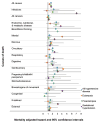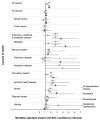All-Cause and Cause-Specific Mortality After Hypertensive Disease of Pregnancy
- PMID: 27400006
- PMCID: PMC4961555
- DOI: 10.1097/AOG.0000000000001534
All-Cause and Cause-Specific Mortality After Hypertensive Disease of Pregnancy
Abstract
Objective: To assess whether women with a history of hypertensive disease of pregnancy have increased risk for early adult mortality.
Methods: In this retrospective cohort study, women with one or more singleton pregnancies (1939-2012) with birth certificate information in the Utah Population Database were included. Diagnoses were categorized into gestational hypertension; preeclampsia; hemolysis, elevated liver enzymes, and low platelet count syndrome; and eclampsia. Women with more than one pregnancy with hypertensive disease (exposed) were included only once, assigned to the most severe category. Exposed women were matched one to two to unexposed women by age, year of childbirth, and parity at the time of the index pregnancy. The causes of death were ascertained using Utah death certificates and the fact of death was supplemented with the Social Security Death Index. Hazard ratios for cause-specific mortality among exposed women compared with unexposed women were estimated using Cox regressions adjusting for neonatal sex, parental education, preterm delivery, race-ethnicity, and maternal marital status.
Results: A total of 60,580 exposed women were matched to 123,140 unexposed women; 4,520 (7.46%) exposed and 6,776 (5.50%) unexposed women had died by 2012. All-cause mortality was significantly higher among women with hypertensive disease of pregnancy (adjusted hazard ratio [HR] 1.65, 95% confidence interval [CI] 1.57-1.73). Exposed women's greatest excess mortality risks were from Alzheimer disease (adjusted HR 3.44, 95% CI 1.00-11.82), diabetes (adjusted HR 2.80, 95% CI 2.20-3.55), ischemic heart disease (adjusted HR 2.23, 95% CI 1.90-2.63), and stroke (adjusted HR 1.88, 95% CI 1.53-2.32).
Conclusion: Women with hypertensive disease of pregnancy have increased mortality risk, particularly for Alzheimer disease, diabetes, ischemic heart disease, and stroke.
Conflict of interest statement
Figures



Comment in
-
Long-Term Mortality After Hypertensive Disease of Pregnancy.Obstet Gynecol. 2016 Aug;128(2):231-233. doi: 10.1097/AOG.0000000000001537. Obstet Gynecol. 2016. PMID: 27399993 No abstract available.
-
All-Cause and Cause-Specific Mortality After Hypertensive Disease of Pregnancy.Obstet Gynecol. 2016 Dec;128(6):1445-1446. doi: 10.1097/AOG.0000000000001789. Obstet Gynecol. 2016. PMID: 27875458 No abstract available.
-
In Reply.Obstet Gynecol. 2016 Dec;128(6):1446. doi: 10.1097/AOG.0000000000001788. Obstet Gynecol. 2016. PMID: 27875459 No abstract available.
References
-
- Carson MP. Society for maternal and fetal medicine workshop on pregnancy as a window to future health: Clinical utility of classifying women with metabolic syndrome. Semin Perinatol. 2015;39(4):284–289. - PubMed
-
- Ghossein-Doha C, Peeters L, van Heijster S, et al. Hypertension after preeclampsia is preceded by changes in cardiac structure and function. Hypertension. 2013;62(2):382–90. - PubMed
-
- Breetveld NM, Ghossein-Doha C, van Kuijk S, et al. Cardiovascular disease risk is only elevated in hypertensive, formerly preeclamptic women. BJOG. 2015;122(8):1092–1100. - PubMed
-
- McDonald SD, Malinowski A, Zhou Q, Yusuf S, Devereaux PJ. Cardiovascular sequelae of preeclampsia/eclampsia: A systematic review and meta-analyses. American Heart Journal. 2008;156(5):918–930. - PubMed
Publication types
MeSH terms
Grants and funding
LinkOut - more resources
Full Text Sources
Other Literature Sources
Medical

